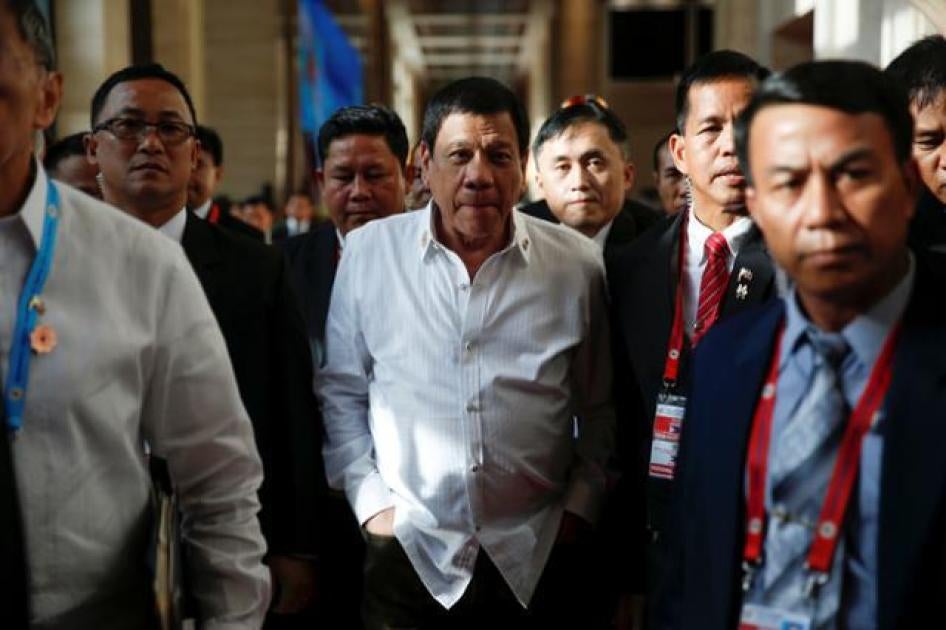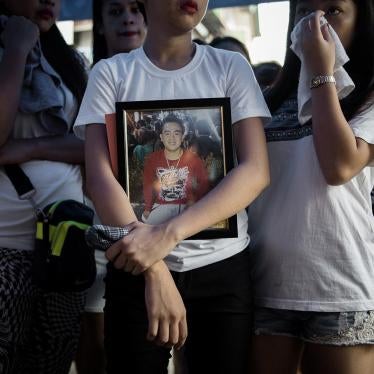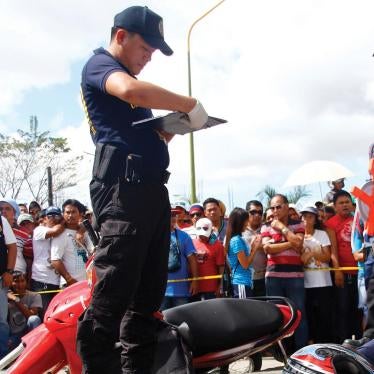US President Barack Obama has aborted his planned bilateral meeting at the East Asia Summit with Philippine President Roderigo Duterte this week in Vientiane, Laos.
Obama canceled the meeting after Duterte referred to him as a "son of a bitch" during a pre-summit media briefing in Manila. Duterte's scandalously undiplomatic invective was part of his profanity-laced reaction to reports that Obama would confront him about the appalling human toll of his so-called "war on drugs" that has killed more than 2,400 Filipinos in the past 10 weeks.
Duterte had good reason to want to avoid such an encounter. That's because Obama's likely message -- stop the killings -- can and should be backed by meaningful US government leverage in terms of its financial aid to the Philippines military and police. Duterte may have effectively scuttled what would have been an awkward and highly-charged meeting with Obama in Laos. But Obama needs to make clear, and soon, that the US government can and will suspend budgetary funding to the Philippine security forces if Duterte chooses to continue to encourage and incite killings by police and unknown gunmen of alleged drug dealers and drug users.
The most recent Philippine National Police data shows that from July 1 to September 4, 2016, police have killed an estimated 1,011 suspected "drug pushers and users." This is more than 10 times higher than the 68 such police killings recorded between January 1 and June 15 of this year. Police have attributed the killings to suspects who "resisted arrest and shot at police officers."
It's been impossible to assess police claims that the killings were all lawful, since Duterte has rejected calls to investigate these deaths. The president has instead declared the killings as proof of the "success" of his anti-drug campaign. He has urged police to "seize the momentum."
In July the Philippine National Police chief, Director-General Ronald dela Rosa, slammed calls for an investigation as "legal harassment," saying it "dampens the morale" of police officers. The same day, Duterte's top judicial official, Solicitor-General Jose Calida, defended the legality of the killings and opined that the number of deaths was "not enough."
The US government shouldn't be surprised by Duterte's enthusiasm for the daily double-digit death toll of his anti-drugs campaign. During his 22-year tenure as the mayor of Davao City in southern Mindanao, Duterte was a vocal cheerleader for a vicious death squad that killed hundreds of "undesirables," including kids as young as 14-years old. Duterte then made large-scale extrajudicial violence as a crime solution the cornerstone of his electoral campaign. On the campaign trail he promised to "solve drugs, criminality, and corruption in three to six months" — by whatever means necessary. On the eve of his May 9, 2016 election victory, he told a crowd of more than 300,000 that "If I make it to the presidential palace I will do just what I did as mayor. You drug pushers, holdup men, and do-nothings, you better get out because I'll kill you."
And police aren't the only ones targeting criminal suspects with deadly force. Police statistics attribute another 1,067 killings of alleged drug dealers and users in the past two months to unknown gunmen. These murders suggest Duterte's aggressive rhetoric advocating violent solutions to criminality has found a receptive, and well-armed audience. Victims include five-year-old Danica May, a kindergarten student who died from a gunshot wound to the head after an unidentified gunman opened fire on her grandfather, an alleged drug user.
In July Duterte exhorted Filipinos who knew of any drug addicts to "go ahead and kill them yourself as getting their parents to do it would be too painful." This prompted the United Nations Special Rapporteur on summary executions, Agnes Callamard, to accuse Duterte last month of effectively granting the police and others "a license to kill."
Duterte has turned a deaf ear to such criticism. He has instead sought to intimidate domestic critics of that campaign and dismissed international critics such as Callamard as "stupid." Duterte has even attempted to justify the mounting death toll of his "war on drugs" by questioning the humanity of drug users: "I'd like to be frank with you, are they [drug users] humans? What is your definition of a human being?" he asked military personnel on August 28.
Obama needs to make clear to Duterte that he will pay an international price for trashing the rule of law and that his unlawful "crime control" campaign puts at risk the $50 million in military aid currently allocated to the Philippines for 2017. Obama should also make clear that the US government is prepared to hold up the millions of dollars that it allocates each year for "training and mentoring for the Philippines National Police" unless the Duterte government launches a credible, impartial investigation into the sharp rise in killings.
By doing so, Obama can send an unambiguous message to Duterte that despite the cancellation of their bilateral meeting, Duterte can't avoid a painful reckoning with his abusive "war on drugs."








